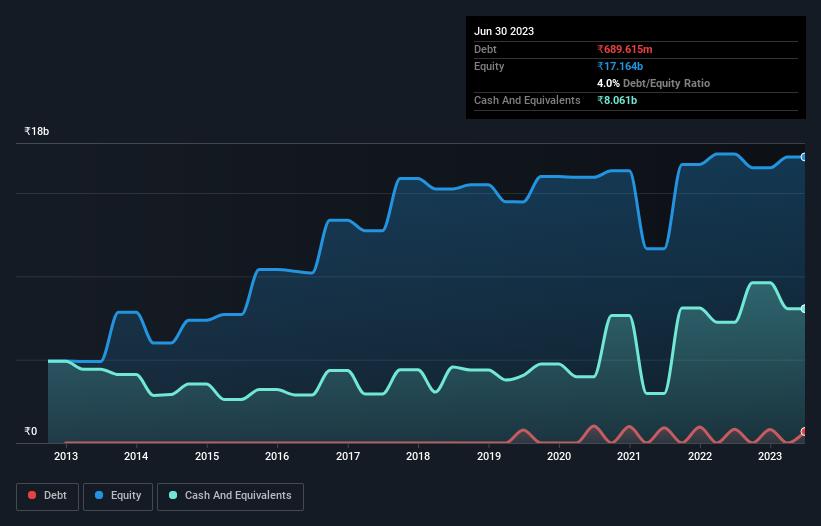- India
- /
- Personal Products
- /
- NSEI:COLPAL
Does Colgate-Palmolive (India) (NSE:COLPAL) Have A Healthy Balance Sheet?

Some say volatility, rather than debt, is the best way to think about risk as an investor, but Warren Buffett famously said that 'Volatility is far from synonymous with risk.' So it might be obvious that you need to consider debt, when you think about how risky any given stock is, because too much debt can sink a company. We note that Colgate-Palmolive (India) Limited (NSE:COLPAL) does have debt on its balance sheet. But is this debt a concern to shareholders?
What Risk Does Debt Bring?
Debt assists a business until the business has trouble paying it off, either with new capital or with free cash flow. If things get really bad, the lenders can take control of the business. However, a more frequent (but still costly) occurrence is where a company must issue shares at bargain-basement prices, permanently diluting shareholders, just to shore up its balance sheet. By replacing dilution, though, debt can be an extremely good tool for businesses that need capital to invest in growth at high rates of return. When we think about a company's use of debt, we first look at cash and debt together.
See our latest analysis for Colgate-Palmolive (India)
How Much Debt Does Colgate-Palmolive (India) Carry?
You can click the graphic below for the historical numbers, but it shows that Colgate-Palmolive (India) had ₹689.6m of debt in March 2023, down from ₹830.5m, one year before. But it also has ₹8.06b in cash to offset that, meaning it has ₹7.37b net cash.

A Look At Colgate-Palmolive (India)'s Liabilities
We can see from the most recent balance sheet that Colgate-Palmolive (India) had liabilities of ₹10.8b falling due within a year, and liabilities of ₹819.7m due beyond that. Offsetting these obligations, it had cash of ₹8.06b as well as receivables valued at ₹2.49b due within 12 months. So its liabilities total ₹1.11b more than the combination of its cash and short-term receivables.
This state of affairs indicates that Colgate-Palmolive (India)'s balance sheet looks quite solid, as its total liabilities are just about equal to its liquid assets. So it's very unlikely that the ₹557.3b company is short on cash, but still worth keeping an eye on the balance sheet. While it does have liabilities worth noting, Colgate-Palmolive (India) also has more cash than debt, so we're pretty confident it can manage its debt safely.
Fortunately, Colgate-Palmolive (India) grew its EBIT by 7.7% in the last year, making that debt load look even more manageable. There's no doubt that we learn most about debt from the balance sheet. But ultimately the future profitability of the business will decide if Colgate-Palmolive (India) can strengthen its balance sheet over time. So if you want to see what the professionals think, you might find this free report on analyst profit forecasts to be interesting.
Finally, a company can only pay off debt with cold hard cash, not accounting profits. Colgate-Palmolive (India) may have net cash on the balance sheet, but it is still interesting to look at how well the business converts its earnings before interest and tax (EBIT) to free cash flow, because that will influence both its need for, and its capacity to manage debt. Over the most recent three years, Colgate-Palmolive (India) recorded free cash flow worth 80% of its EBIT, which is around normal, given free cash flow excludes interest and tax. This free cash flow puts the company in a good position to pay down debt, when appropriate.
Summing Up
We could understand if investors are concerned about Colgate-Palmolive (India)'s liabilities, but we can be reassured by the fact it has has net cash of ₹7.37b. The cherry on top was that in converted 80% of that EBIT to free cash flow, bringing in ₹11b. So is Colgate-Palmolive (India)'s debt a risk? It doesn't seem so to us. When analysing debt levels, the balance sheet is the obvious place to start. But ultimately, every company can contain risks that exist outside of the balance sheet. We've identified 1 warning sign with Colgate-Palmolive (India) , and understanding them should be part of your investment process.
At the end of the day, it's often better to focus on companies that are free from net debt. You can access our special list of such companies (all with a track record of profit growth). It's free.
New: AI Stock Screener & Alerts
Our new AI Stock Screener scans the market every day to uncover opportunities.
• Dividend Powerhouses (3%+ Yield)
• Undervalued Small Caps with Insider Buying
• High growth Tech and AI Companies
Or build your own from over 50 metrics.
Have feedback on this article? Concerned about the content? Get in touch with us directly. Alternatively, email editorial-team (at) simplywallst.com.
This article by Simply Wall St is general in nature. We provide commentary based on historical data and analyst forecasts only using an unbiased methodology and our articles are not intended to be financial advice. It does not constitute a recommendation to buy or sell any stock, and does not take account of your objectives, or your financial situation. We aim to bring you long-term focused analysis driven by fundamental data. Note that our analysis may not factor in the latest price-sensitive company announcements or qualitative material. Simply Wall St has no position in any stocks mentioned.
About NSEI:COLPAL
Colgate-Palmolive (India)
Manufactures and trades in personal and oral care products in India.
Flawless balance sheet with solid track record.

